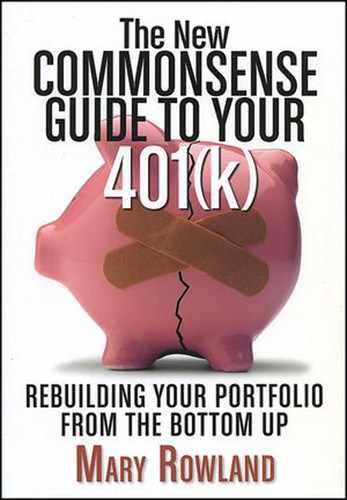I DIDN'T CALL ROBERT MARKMAN to get his advice on investing because I know what his advice has been in the past. I include him in this section only to show that you must have discipline and stick with your plan regardless of what you read in the newspaper or see on the Internet. Never buy or sell investments based on something you read or hear on television. Indeed, you should look for contrary indicators, and I think Bob Markman may be one of them.
Markman is a financial advisor and mutual fund entrepreneur based in Minneapolis. Before I criticize his first dramatic move—advising clients in the spring of 1999 to put all their money in growth stocks and growth mutual funds—I must say that his advice looked mighty tempting at the time. Until the late 1990s, I had considered myself a value investor or an investor in stocks and stock mutual funds that searched for hidden value in companies. When I talked with Henry Emerson, editor of the Outstanding Investor Digest: Perspectives and Activities of the Nation's Most Successful Money Managers—a newsletter that has achieved something of a cult status among the value cognoscenti—I felt that I was in the presence of genius and that the value investors he wrote about, like Warren Buffett, were the smartest investors, those who bought when investments were out of favor and made hay. But in the final years of the twentieth century, the value funds in my portfolio were shrinking while the tech stocks were doubling and tripling and more. It seemed like the end of the old era and the beginning of something new.
Markman certainly thought so. He claimed that asset allocation was dead. The only asset category he found worth investing in was large cap growth. He told me that he'd identified the five strongest mutual funds in America: Janus 20, White Oak Growth, Rydex OTC, Marsico Focus, and Papp America Abroad. "If these are the best funds I can find, why should I invest in worse funds?" he asked. I thought he was a bit reckless. In truth mutual funds perform well in different environment. No one fund is always on top. In 2000, Markman came out with a book, Hazardous to Your Wealth: Extraordinary Popular Delusions and the Madness of Mutual Fund Experts, in which he argued that diversification among different types of stocks—an article of faith among investment experts—only dilutes investment profits. Instead, Markman said, stocks of large, fast-growing companies, primarily the tech giants, should dominate your portfolio. The book was published with very bad timing. The tech bubble burst at about the time it come out. Kiplinger's magazine inducted Markman into its Mutual Hall of Shame in 2003, commenting that "investors in Markman's four funds lost their shirts," when the tech bubble burst.
But guess what happened in the first quarter of 2009? Markman pronounced that stocks are no place for the individual investors. "Americans are now taking far too much risk in their portfolios," he said. Worse yet, he wrote a column in the Minneapolis Star Tribune accusing financial advisors who told their clients to buy and hold during the market crash of using a "Rambo strategy" and of working against the best interest of their clients. A decade after Markman had claimed that growth stocks were the only way to go for the smart investor, he opined that we little guys should not be investing in stocks at all, and we wouldn't be if left to our own devices. He went on to blame this disaster on financial planners who sold stocks to clients only so that they could earn more commissions.
Yes, we certainly do respect free speech. But the danger of an adviser like Markman is that he might convince investors to forsake their strategy at the worst time, locking in their losses. Don't do that. Whenever people start saying: This time is different, this is a new era, the old rules don't apply, sit down and mull it over carefully. Don't bail on your plan because of something scary you read in the newspaper or see online. Remember what an investor like Don Phillips of Morningstar says: Be prudent. Pay off debt. Save and invest.
